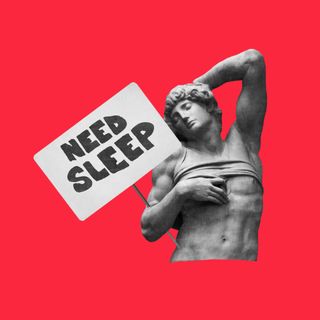
Pretty Under Capitalism
The beauty industry will never let us love ourselves, despite its promises. But self-love was never a worthy goal anyway.
.png?rect=0,565,3375,2246&w=320&h=213&fit=min&auto=format)
In ‘Love Under Capitalism,’ we look at how desire, intimacy, and relationships intersect with the logic of capitalism.
Does beauty exist?
It was a question writ large, albeit implicitly, when the Internet woke up to Nepal’s Miss Universe contestant, Jane Dipika Garrett, sashaying down the runway in a swimsuit – the pageant’s only “plus-size” contestant in its history. She was beautiful. Everyone agreed, nodding along that beauty is more “inclusive” today, mouthing platitudes about “big” being beautiful, not questioning the rhetorical slip of “plus-size” to describe a woman who is just a bit larger than the average model. Not acknowledging, even, the way “plus” implies a normal – a number of points above the standard, the desirable. Choosing to ignore the unattainable proportionality of her body and the perfect symmetry of her facial features. But that wasn’t the highlight; instead, it was how she loved herself. Her confidence. That was her beauty.
Garrett may have smashed stereotypes, but her presence is proof of an inviolable truth of self-love capitalism: it goes through an infinite cycle of birth and death, being reborn in subsequent lives as a new ploy to sell more products. In this instance, Garrett’s participation in the runway is arguably the final form of body positivity capitalism – where the idea of beauty is shoved inward, and consumers are lovingly reassured that the only thing that matters is that they love themselves. And by that, they mean your own appearance. In late capitalism, the surface is the self; and self-love is beauty. All you have to do, with gritted teeth, is believe in the power of self-love and confidence to feel beautiful. Brands have long stopped advocating for being beautiful – they know they can never truly change how somebody looks. Only how they feel.
It’s the beauty industry’s version of taking the red pill. Beauty is inside, is confidence, is self-love, and here is a 10-step skincare routine, seventeen different make-up products, double the number of tutorials, a “size-inclusive” lingerie set, a crop-top that shows off your belly (because you should believe it’s okay to have one), and hoop earrings to bring definition to a face that has gone above and beyond doing its best, and deserves to be seen. The Paris filter on Instagram applies an extra sheen of buttery softness, because self-love must be perceived by others. It’s the beauty–self-love paradox: love yourself so that nobody else has to love you; but show your self-love off so that everyone does love you. It’s the second step of the process where the cracks begin to show. Inevitably, not as many people like what they see as you anticipated, and a consumer vacuum is created: more products, more optimization, more effort is required to love yourself so that just the right number of people love you.
Self-love through beauty, in other words, is a more roundabout pursuit of love from others. Instead of Abercrombie and Fitch or Tommy Hilfiger openly advertising themselves for thin, White, blue-eyed blonde-haired beauties only, we now have Dove and Adidas turning the gaze inward to insist that everyone is equal in beauty as long as they only look at themselves. And once the studio lights are turned off, once the photoshoot is wrapped, the models – of all shapes, sizes, colors – step back into the real world, subject to its unequal glances, its disproportionate attention, its cruel, quiet scorn.
Beauty does exist. And it will never let us love ourselves.
The downfall of Victoria’s Secret was an opportune moment for a beauty industry reset. Lingerie brands, make-up brands, skin-care brands, and even athleisure brands are now onto the fact that monetizing unhappiness is no longer a good business strategy. It’s not profitable to sell people unachievable beauty. But dissatisfaction, on the other hand. That’s personal. That’s intimate. It’s within the self. And therein arrived the next phase of late capitalism: convincing consumers that beauty – whatever it may be, however it may look – was an undefinable, intangible thing. It is no longer knowable or visible. It is a quality, and it exists inside. The way to reach it is to dig an entrance to it through our own bodies. It’s to slather ourselves with everything they tell us to; wear what they insist will help us, and set off on a journey into ourselves. The labyrinthine complex of beauty within ensures we remain stuck there; perpetually searching for the elusive “X” on the treasure map, a creeping realization dawning on us that it doesn’t exist. We’re trapped inside ourselves searching for beauty, when beauty was always on the outside.
Here’s the other paradox of self-love beauty: it doesn’t allow us to escape the centrality of images and appearances in our lives. Almost all influencers, including – maybe even especially – the ones who advocate self-love know this. Their business model relies on being visible, on centering appearance, the literal surface, in their online presence. “As social media demanded more images, beauty filters proliferated accordingly,” Charlotte Shane wrote in Wired. Self-love for one’s appearance can never exist as long as beauty exists. They are mutually exclusive. We exist in digital space only if we’re visible. We’re loved in digital space only if we’re beautiful. We can insist that we are, and people will love our confidence while insisting they think we’re beautiful too. The algorithm rewards all of this. And none of it ever changes what beauty inherently means, has always meant: White supremacist, caste-supremacist capitalism.
“Appearance is the most public part of the self. It is our sacrament, the visible self that the world assumes to be a mirror of the invisible, inner self,” writes Nancy Etcoff. “This assumption may not be fair, and not how the best of all moral worlds would conduct itself. But that does not make it any less true. Beauty has consequences that we cannot erase by denial.” The equation of appearance with the inner self is what the beauty industry truly sells. Beauty as morality. Or, in the absence of it; the pursuit of beauty as morality – the new Protestant work ethic, directed inward rather than applied externally.
It explains why beauty is the new frontier for celebrity business. “Most stars, in India at least, find their voices clipped when it comes to political views, feminist or Left-wing rebellion or the country’s religious divisiveness. Smartly perhaps, they understand that the only thing they can change with their influence is the hydration of our skin and hair, the shape of our eyeliners, the glitter on our nails, the sneakers we wear,” writes Shefalee Vasudev in Voice of Fashion.
Consider the fact that no brand actually wants you to really feel beautiful. If everyone is beautiful, after all, nobody is beautiful. And beauty ceases to exist. Thereby, the beauty empire falls. The goal is to keep consumers like hamsters on a wheel, chasing the elusive dangling carrot. The pursuit of self-love through beauty is Sisyphean. It can never be accomplished.
Meanwhile, the pursuit to love ourselves distances us from loving others. As long as we pedestalize beauty, chase it, aspire to it, and equate it with loving ourselves, we center it in our perception of others. How much do we truly love others who don’t aspire to beauty in the same ways? As Audrey Millet writes, “Clothes have become the criteria of a system of evaluation of people. Style indicates the degree of interest in the human being. This ‘no style, no attention’ approach shows that appearance is the barometer for the treatment of people.”
Sociologists Shani Orgad and Rosalind Gill, in their book “Confidence Culture,” call confidence a cult. “Rather than identifying social issues and working collectively to change them, confidence culture turns away from wider political, economic and social issues and encourages women to turn inwards and work on themselves as a means of doing and feeling better,” Gill explained to Dazed. “Confidence isn’t our target. It’s the individualistic and psychologised way of understanding it that locates the problem in women themselves rather than in the systemic injustices of neoliberal capitalism.”
Under the paradigm of beauty-as-confidence: we buy all we can buy to achieve it, and we’re compelled, against our better judgment, to treat those who can’t with pity or disdain. Capitalism turned beauty into confidence, confidence into self-love, self-love into self-respect, self-respect into morality. And that’s how it becomes compulsory to strive for beauty at any cost.
The beauty-as-empowerment industrial complex explains the return of thinness as the ideal – one that can now be safely claimed as a choice, as a means for individuals to feel beautiful from within, promising not to judge others who don’t look like they do. It’s the age of Ozempic and glutathione and the explosion of easy, non-invasive cosmetic procedures. Everyone’s taking them, nobody’s admitting it, and the sudden shedding of weight and paleness of skin are explained away as simply products of self-love, self-optimization, or better yet, not explained at all. “The history of the human body is marked by many modifications,” Millet writes. “However, never before have attempts to modify the body been so widespread, nor has the ideal been so unattainable. The impossible version of beauty is a constant source of pressure for those who claim it.”
But the pursuit of beauty begs the question: does real beauty exist? We know it when we see it, and we also understand the ways in which White supremacy, caste-supremacy, colonization and racism shaped what we are supposed to find beautiful. It’s old hat. But take away our history, return to the blank slate: what is beauty? “The human image has been subjected to all manner of manipulation in an attempt to create an ideal that does not seem to have a human incarnation,” Etcoff continues, reflecting on how artists, poets, painters, and every manner of expert on the subject could never define what beauty was, except for what it wasn’t. Even cosmetic surgeons, displaying faces considered to be beautiful, could point out flaws on the most beautiful of faces. There isn’t a person on Earth for whom it was impossible to be more beautiful.
The fact, then, that the version of beauty we have to work with is so exclusionary makes it a resource only available to a few, at the expense of others. Consider the fact that it took the French Revolution to end the hoarding of flour for aristocrats’ hair care, which had led to food shortage. When we aspire to beauty, we stop caring about others. Beauty is greed, and capital, even if it is self-love. Self-love defined through beauty is not inherently worthy or noble, contrary to what the brands say. It is only acquired through further capital. And that makes beauty unequal. That makes it worthy of abolition.
Abolishing beauty-capitalism is to ask: do we deserve love – and can we love others – without beauty? The answer, hopefully, is yes. It has to be.
Rohitha Naraharisetty is a Senior Associate Editor at The Swaddle. She writes about the intersection of gender, caste, social movements, and pop culture. She can be found on Instagram at @rohitha_97 or on Twitter at @romimacaronii.
Related


Everyone's Sleepless, Exhausted. Why Did Rest Become So Scarce?
.png?rect=0,80,1280,1280&w=320&h=320&fit=min&auto=format)